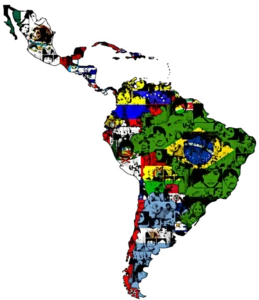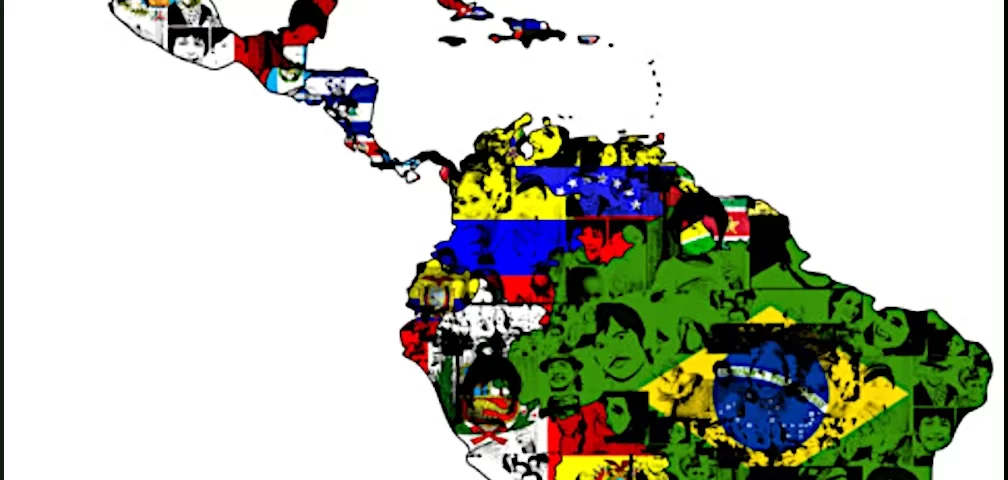by Stephen Sefton, published on Tortilla con Salsa, October 30, 2022
The military, economic, diplomatic and psychological war between the Russian Federation and NATO has revealed several weaknesses in the ability of the United States and its allies to maintain their dominance in the world. A remarkable fact has been that practically no government in Latin America and the Caribbean has collaborated with the illegal coercive measures of the United States and the European Union against Russia and Belarus. Nor do the countries of Latin America and the Caribbean collaborate in the aggressive policies of the United States and the European Union against China.
This continental reality is largely explained by the different experiences of the respective cooperation policies of China, Russia, the United States and the European Union. It is instructive to explore these experiences, focusing on the contrast between the practice of development cooperation on the part of Russia and China and the corresponding US practice. In that regard, on October 27th last, President Vladimir Putin commented in his remarks to the Valdai Club:
“Technological development should not increase global inequality, but rather reduce it. This is how Russia has traditionally implemented its foreign technology policy. For example, when we build nuclear power plants in other countries… In fact, we give other countries a chance to break new ground in their scientific and technological development, reduce inequality, and bring their energy sector to new levels of efficiency and environmental friendliness…
If liberal globalisation is about depersonalising and imposing the Western model on the entire world, integration is, in contrast, about tapping the potential of each civilisation for everyone to benefit. If globalism is dictate – which is what it comes down to eventually, – integration is a team effort to develop common strategies that everyone can benefit from.”
In Nicaragua, our experience of Russian cooperation reflects this vision of respect, equity and solidarity. Apart from the growing trade relations and educational and cultural exchanges, Russia supports Nicaragua in different areas, for example with information from the Glonass satellite system, with imports of hundreds of buses for public transport and with significant quantities of wheat. Donations of vaccines against Covid-19 have been a key aspect of health collaboration, in addition to the production of vaccines at the Mechnikov plant in Managua. Russia is also cooperating with resources and training to combat organized crime and drug trafficking and with the modernization of the equipment of the Nicaraguan Army.
The limited trade profile of imports from the Russian Federation to the region (40% of fertilizers and 15% of semi-finished steel among others) does not reflect the importance of Russian cooperation in Latin America and the Caribbean, especially in the nuclear technology sector. Russia maintains extensive cooperation in this sector with the entire region in the implementation of mutually beneficial scientific, educational and commercial projects. This cooperation covers agreements for the supply of isotope products, radio-pharmaceutical infrastructure and irradiation processes and the development of the nuclear industry.
Russia has extensive cooperation agreements in the nuclear sector with Brazil, Argentina, Bolivia, Paraguay, Peru, Mexico and Cuba. With Cuba, Russia also collaborates in oil exploration, aeronautics and space technology, and the two countries maintain constant sport and cultural exchanges, in education and health care, as well as in energy and food security. Likewise, with Venezuela, Russia maintains close cooperation ties through more than 260 binational agreements in the areas of energy, industrial development, construction, medicine, tourism, agriculture and mining.
In the case of China, President Xi Jinping has expressed a vision of development cooperation similar to that of President Vladimir Putin. In January of this year, for example, in words addressed to the World Economic Forum, President Xi Jinping commented:
“No matter what difficulties may come our way, we must adhere to a people-centered philosophy of development, place development and livelihoods front and center in global macro-policies, realize the UN’s 2030 Agenda for Sustainable Development, and build greater synergy among existing mechanisms of development cooperation to promote balanced development worldwide.”
China has become the first or second commercial and financial partner of many countries in Latin America and the Caribbean. In terms of cooperation and investment, it is estimated that China implemented more than 80 infrastructure projects in the fifteen years from 2005 to 2019. In Argentina, projects with a value of more than US$30 billion dollars were carried out and in Peru, investments also worth around US$30 billion, developed the energy and mining sectors, fisheries and forestry and infrastructure projects. China has cooperated with Bolivia on road, energy and transport projects worth US$17 billion.
In Ecuador, China has helped with projects worth more than US $9 billion in infrastructure and energy. In Central America and the Caribbean, up until 2019 China had implemented projects worth almost US $10 billion. With Venezuela, China has developed a close strategic relationship that includes, apart from extensive commercial and financial relations, all types of investment in industry, transport, mining, housing, digital technology and communications. China cooperates with Cuba in the development of its nickel industry, oil resources, biotechnology, tourism and infrastructure as well as cultural, educational and sports exchanges.
 This year, Argentina and China agreed to build another nuclear power plant at a cost of US$ 8 billion. With Chile, China also has an extensive portfolio of cooperation programs and projects in hydroelectric energy, digital technology and communications, astronomy, agricultural technology and education. Gradually, China is diversifying the range of projects it finances in the region. Between 2012 and 2019 it is estimated that China has disbursed loans amounting to almost US$140 billion to 18 countries in Latin America and the Caribbean.
This year, Argentina and China agreed to build another nuclear power plant at a cost of US$ 8 billion. With Chile, China also has an extensive portfolio of cooperation programs and projects in hydroelectric energy, digital technology and communications, astronomy, agricultural technology and education. Gradually, China is diversifying the range of projects it finances in the region. Between 2012 and 2019 it is estimated that China has disbursed loans amounting to almost US$140 billion to 18 countries in Latin America and the Caribbean.
The huge and diverse investments of China and the quality of technological investment of the Russian Federation contrast sharply with the relative lack of economic investment from US cooperation and its highly ideological nature. Since the end of World War II, American development cooperation has been managed not to promote the development of its counterpart countries, but to promote the geopolitical interests of the United States and ensure its ideological and cultural dominance. In 2021, President Biden’s regime reaffirmed this reality in its document “Interim Guide to the National Security Strategy” which notes “Global development is among our best methods to articulate and realize our values while simultaneously pursuing our national security interests.”
The United States’ control of major international financial institutions such as the International Monetary Fund and the World Bank allows it to control the finance made available by those institutions for investment projects in Latin America and the Caribbean. US bilateral development cooperation is managed by the United States International Development Agency (USAID). This so-called cooperation is complemented by hundreds of millions of dollars in funds disbursed by quasi non-governmental institutions such as the National Endowment for Democracy, the International Republican Institute and the National Democratic Institute, aimed at non-governmental organizations abroad as tools for US intervention.
Over time, US policies for achieving, promoting and maintaining its global dominance have changed, shape shifting from one period to the next. For example, in December 2019, the US Congress passed the little-known Global Fragility Act, which the editors of Black Agenda Report describe as “a re-setting of US foreign policy in ways that shift tactics while maintaining the objectives and strategies of U.S. global domination.”
The Act prioritizes human rights and governance and emphasizes environmental issues. It stresses the priority importance of attention to gender issues for achieving equity and equality and also prioritizes the issue of governance of security forces while openly advocating efforts to control rival powers such as China and Russia. In effect, it is an update of the “soft power” policies of President Obama, which developed to the maximum the false manipulation of human rights and, too, the abuse of criminal justice systems for political purposes, often called ”lawfare“.
President Biden’s “Partnership of the Americas for Economic Prosperity” proposal presented in June of this year deepens the neoliberal approach of the Global Fragility Act. In effect, US development cooperation marginalizes the issue of poverty reduction and the defense of economic and social rights. It promotes neocolonial intervention under the pretext of defending the environment, advances Western ideas of identity and gender over traditional cultural values and explores how to co-opt national security forces.
While China and Russia continue to promote a vision of a multipolar world based on genuine cooperation inspired by respect and equity, in Latin America and the Caribbean the United States continues to apply illegal coercive measures against Cuba, Nicaragua and Venezuela. Likewise, they continue to apply similar punitive measures against twenty other countries around the world, including Iran, Russia and China. Similarly, interference and intervention by US embassies around the world is constant.
In Latin America and the Caribbean, the respective U.S. embassies this year have publicly accused several serving officials in Paraguay and Guatemala of corruption. In Argentina, the US ambassador has intervened in the electoral process for 2023, with comments and suggestions on possible alliances and candidates. In Honduras, the ambassador has openly criticized government measures to reform the energy sector, among other improper interventions in the internal affairs of that country. The US continues to abuse its cooperation programs in the region, seeking to super-impose its justice system on national jurisdications.
In Nicaragua, the days are gone when yankee ambassador Oliver Garza could march into the Supreme Electoral Council’s vote counting center, as he did on the night of the 2001 elections, and demand changing the personnel after earlier campaigning openly for the candidate of the Liberal Alliance in those elections. As President Daniel Ortega has said, Nicaragua will never again be anyone’s colony. In the same way, the countries of Latin America and the Caribbean keep their options open in their relations with the Russian Federation and the People’s Republic of China and, admittedly to varying degrees, increasingly reject counterproductive neocolonial submission to the wishes of the United States and the European Union.
Stephen Sefton is a British journalist who has lived in Nicaragua for 20 years. He is co-editor of Tortilla Con Sal, a leftist blog on Nicaragua and South America.
